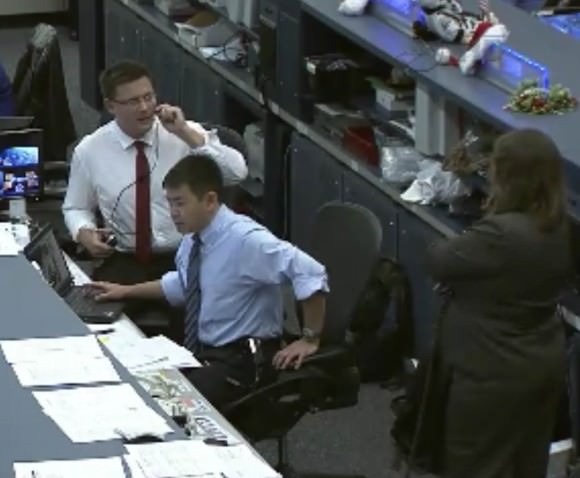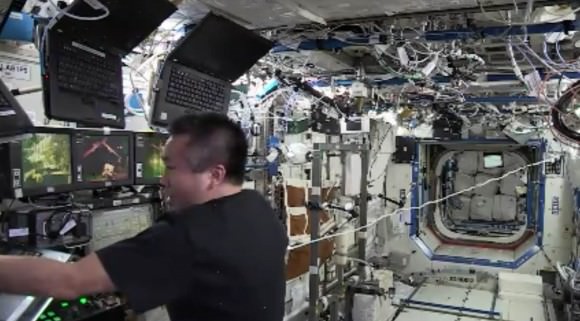Toxic snowflakes in space were just one obstacle astronauts faced down today (Dec. 24) as they successfully replaced an ammonia pump that will, if all goes to plan, put the space station back in full service in a few hours.
“They’re just completely surrounding us now,” radioed NASA astronaut Rick Mastracchio of the ammonia flakes as the astronauts clipped four fluid lines into place on to the spare pump. NASA said the ammonia was just residual fluid and not indicative of a leak. “Some little ones, some big ones,” he added.
Within a few minutes, however, the ammonia dissipated. Some flakes did strike the spacesuits of Mastracchio and fellow NASA spacewalker Mike Hopkins, causing NASA to do a modified decontamination procedure where the astronauts stayed in a vacuum for a few extra minutes inside the airlock. (The sun’s heat bakes off ammonia over time, and the crew was outside long enough for most ammonia to dissipate, NASA said.)
The spacewalk completed with no further drama at 7 hours and 30 minutes, earning high praise for the participating astronauts from Mission Control in Houston.
“It’s the best Christmas ever,” radioed CapCom and NASA astronaut Doug Wheelock from the ground as the spacewalkers entered the International Space Station’s Quest airlock at the end of the repair job. “We got it,” Mastracchio responded.

Preliminary tests show the spare pump is working perfectly. The pump is a welcome present for the six-person Expedition 38 crew, which saw a reduction in science and backup systems for two weeks after a valve in the last pump failed, causing one of the station’s two cooling loops to shut down automatically. The loops are needed to regulate the temperatures of electronics and systems on station.
The Expedition 38 crew was so quick with the repair that they finished the job in two spacewalks instead of the planned three. The astronauts fell behind the timeline today as they struggled with some of the fluid connections to the new pump, but the final steps — putting the electrical connections in place — took just minutes. The pump was brought from another location on station today, and installed into its permanent spot to help ammonia flow through the cooling system.
Anywhere between hundreds and thousands of people at NASA and international partners scrambled to put spacewalks together to fix the cooling problem after it happened. Wheelock, himself a veteran of a tricky ammonia pump repair in 2010, communicated with the spacewalkers. Japanese astronaut Aki Hoshide filled the other CapCom slot, helping Japanese astronaut Koichi Wakata who handled robotics in orbit.

Mastracchio marked his eighth spacewalk with today’s repair while Hopkins, who rode Canadarm2 for the first time in a last-minute decision, was on his second. As with a spacewalk on Saturday (Dec. 21), the astronauts reported no helmet water leaks — comforting words for agency officials who put in new procedures and parts after an incident in July. (Mastracchio experienced a water problem during repressurization Saturday that was unrelated to the first incident, and wore a backup suit today to let the primary one dry out.)
Should the ammonia pump work as planned, this clears the way for the Russians to do a spacewalk Dec. 27 to install the Urthecast high-resolution camera that will beam live views of Earth, among other tasks. Expedition 38 has the day off tomorrow (Dec. 25), NASA TV added.
The only other Christmas Eve spacewalk in NASA history took place Dec. 24, 1999 during Hubble Space Telescope servicing mission STS-103. Another Christmas Eve milestone for NASA took place 45 years ago today, when the Apollo 8 crew made a now-famous broadcast while orbiting above the moon.


Watched most of this live but missed the ‘snowstorm’. Awesome to get live coverage and see the efficient work techniques and tech the astronauts use.
Why don’t the use the Russian space suits ?
What a great Christmas present! AND a wonderful feeling of relief… DONE and done~ YAS! Gonna have to watch/look up a video showing the ‘snow storm’… GO CYGNUS!
Congratulations to ISS Team, on board and at the Control Center…
More design reviews and tests could be cheaper…! Lets consider it…